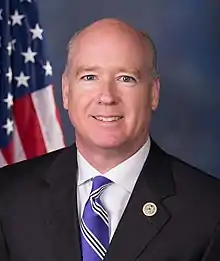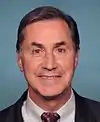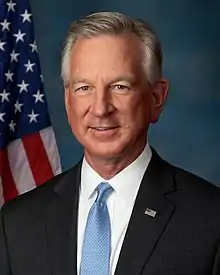United States congressional delegations from Alabama
These are tables of congressional delegations from Alabama to the United States House of Representatives and the United States Senate.

U.S. House of Representatives
Current members
List of members, their terms in office, district boundaries, and the district political ratings according to the CPVI. The delegation has 7 members: 6 Republicans and 1 Democrat.
| Dist rict |
Member | District | |||
|---|---|---|---|---|---|
| Member (District residence) |
Party | Incumbency | CPVI | Map | |
| 1st |  Jerry Carl (Mobile) |
Republican | January 7, 2021 | R+15 | .tif.png.webp) |
| 2nd |  Barry Moore (Enterprise) |
Republican | January 3, 2021 | R+17 | .tif.png.webp) |
| 3rd |  Mike Rogers (Tuskegee) |
Republican | January 3, 2003 | R+16 | .tif.png.webp) |
| 4th |  Robert Aderholt (Gadsden) |
Republican | January 3, 1997 | R+28 | .tif.png.webp) |
| 5th |  Mo Brooks (Huntsville) |
Republican | January 3, 2011 | R+17 | .tif.png.webp) |
| 6th |  Gary Palmer (Vestavia Hills) |
Republican | January 3, 2015 | R+28 | .tif.png.webp) |
| 7th |  Terri Sewell (Birmingham) |
Democratic | January 3, 2011 | D+20 | .tif.png.webp) |
1818–1819: 1 non-voting delegate
Starting on January 29, 1818, Alabama Territory sent a non-voting delegate to the House.
| Congress | Delegate |
|---|---|
| 15th (1817–1819) |
John Crowell (DR) |
| 16th (March 4, 1819 – December 14, 1819) |
Vacant |
1819–1823: 1 seat
After statehood on December 14, 1819, Alabama had one seat in the House.
| Congress | At-large district |
|---|---|
| 16th (December 14, 1819 – 1821) |
John Crowell (DR) |
| 17th (1821–1823) |
Gabriel Moore (DR) |
1823–1833: 3 seats
Following the 1820 census, Alabama had three seats.
| Congress | District | ||
|---|---|---|---|
| 1st | 2nd | 3rd | |
| 18th (1823–1825) |
Gabriel Moore (DR)[lower-alpha 1] |
John McKee (DR)[lower-alpha 1] |
George W. Owen (DR)[lower-alpha 1] |
| 19th (1825–1827) |
Gabriel Moore (J) |
John McKee (J) |
George W. Owen (J) |
| 20th (1827–1829) | |||
| 21st (1829–1831) |
Clement Comer Clay (J) |
Robert Emmett Bledsoe Baylor (J) |
Dixon Hall Lewis (J) |
| 22nd (1831–1833) |
Samuel Wright Mardis (J) | ||
1833–1843: 5 seats
Following the 1830 census, Alabama had five seats. During the 27th Congress, those seats were all elected statewide at-large on a general ticket.
| Congress | District | ||||
|---|---|---|---|---|---|
| 1st | 2nd | 3rd | 4th | 5th | |
| 23rd (1833–1835) |
Clement Comer Clay (J) |
John McKinley (J) |
Samuel Wright Mardis (J) |
Dixon Hall Lewis (N) |
John Murphy (J) |
| 24th (1835–1837) |
Reuben Chapman (J) |
Joshua L. Martin (J) |
Joab Lawler (J) |
Francis Strother Lyon (Anti-J) | |
| 25th (1837–1839) |
Reuben Chapman (D) |
Joshua L. Martin (D) |
Joab Lawler (W) |
Dixon Hall Lewis (D) |
Francis Strother Lyon (W) |
| George Whitfield Crabb (W) | |||||
| 26th (1839–1841) |
David Hubbard (D) |
James Dellet (W) | |||
| 27th (1841–1843) |
5 seats elected at-large on a general ticket | ||||
| 1st seat | 2nd seat | 3rd seat | 4th seat | 5th seat | |
| Reuben Chapman (D) |
George S. Houston (D) |
William Winter Payne (D) |
Dixon Hall Lewis (D) |
Benjamin Glover Shields (D) | |
1843–1863: 7 seats
Following the 1840 census, Alabama resumed the use of districts, now increased to seven.
1863–1873: 6 seats
Following the 1860 census, Alabama was apportioned six seats.
| Congress | District | |||||
|---|---|---|---|---|---|---|
| 1st | 2nd | 3rd | 4th | 5th | 6th | |
| 38th (1863–1865) |
Vacant during American Civil War | |||||
| 39th (1865–1867) | ||||||
| 40th (1867–1869) | ||||||
| Francis William Kellogg (R) |
Charles Waldron Buckley (R) |
Benjamin White Norris (R) |
Charles Wilson Pierce (R) |
John Benton Callis (R) |
Thomas Haughey (R) | |
| 41st (1869–1871) |
Alfred Eliab Buck (R) |
Robert Stell Heflin (R) |
Charles Hays (R) |
Peter Myndert Dox (D) |
William Crawford Sherrod (D) | |
| 42nd (1871–1873) |
Benjamin Sterling Turner (R) |
William Anderson Handley (D) |
Joseph Humphrey Sloss (D) | |||
1873–1893: 8 seats
Following the 1870 census, Alabama was apportioned eight seats. From 1873 to 1877, the two new seats were elected at large, statewide. After 1877, however, the entire delegation was redistricted.
1893–1913: 9 seats
Following the 1890 census, Alabama was apportioned nine seats.
| Congress | District | ||||||||
|---|---|---|---|---|---|---|---|---|---|
| 1st | 2nd | 3rd | 4th | 5th | 6th | 7th | 8th | 9th | |
| 53rd (1893–1895) |
Richard Henry Clarke (D) |
Jesse F. Stallings (D) |
William C. Oates (D) |
Gaston A. Robbins (D) |
James E. Cobb (D) |
John H. Bankhead (D) |
William Henry Denson (D) |
Joseph Wheeler (D) |
Louis Washington Turpin (D) |
| George Paul Harrison Jr. (D) | |||||||||
| 54th (1895–1897) |
Milford W. Howard (Pop) |
Oscar W. Underwood (D) | |||||||
| William F. Aldrich (R) |
Albert Taylor Goodwyn (Pop) |
Truman Heminway Aldrich (R) | |||||||
| 55th (1897–1899) |
George W. Taylor (D) |
Henry D. Clayton (D) |
Thomas S. Plowman (D) |
Willis Brewer (D) |
Oscar W. Underwood (D) | ||||
| William F. Aldrich (R) | |||||||||
| 56th (1899–1901) |
Gaston A. Robbins (D) |
John L. Burnett (D) | |||||||
| William F. Aldrich (R) |
William N. Richardson (D) | ||||||||
| 57th (1901–1903) |
Ariosto A. Wiley (D) |
Sydney J. Bowie (D) |
Charles Winston Thompson (D) | ||||||
| 58th (1903–1905) | |||||||||
| J. Thomas Heflin (D) | |||||||||
| 59th (1905–1907) | |||||||||
| 60th (1907–1909) |
William B. Craig (D) |
Richmond P. Hobson (D) | |||||||
| Oliver C. Wiley (D) | |||||||||
| 61st (1909–1911) |
S. Hubert Dent Jr. (D) | ||||||||
| 62nd (1911–1913) |
Fred L. Blackmon (D) | ||||||||
1913–1933: 10 seats
Following the 1910 census, Alabama was apportioned ten seats. At first, the extra seat was elected at-large. Starting with the 1916 elections, the seats were redistricted and a tenth district was added.
| Congress | District | At-large | ||||||||
|---|---|---|---|---|---|---|---|---|---|---|
| 1st | 2nd | 3rd | 4th | 5th | 6th | 7th | 8th | 9th | ||
| 63rd (1913–1915) |
George W. Taylor (D) |
S. Hubert Dent Jr. (D) |
Henry D. Clayton (D) |
Fred L. Blackmon (D) |
J. Thomas Heflin (D) |
Richmond P. Hobson (D) |
John L. Burnett (D) |
William N. Richardson (D) |
Oscar W. Underwood (D) |
John Abercrombie (D) |
| William Oscar Mulkey (D) |
Christopher Columbus Harris (D) | |||||||||
| 64th (1915–1917) |
Oscar Lee Gray (D) |
Henry B. Steagall (D) |
William B. Oliver (D) |
Edward B. Almon (D) |
George Huddleston (D) | |||||
| 65th (1917–1919) |
10th district | |||||||||
| William B. Bankhead (D) | ||||||||||
| 66th (1919–1921) |
John McDuffie (D) | |||||||||
| William B. Bowling (D) |
Lilius Bratton Rainey (D) | |||||||||
| 67th (1921–1923) |
John R. Tyson (D) |
Lamar Jeffers (D) | ||||||||
| 68th (1923–1925) |
Miles C. Allgood (D) | |||||||||
| J. Lister Hill (D) | ||||||||||
| 69th (1925–1927) | ||||||||||
| 70th (1927–1929) | ||||||||||
| LaFayette L. Patterson (D) | ||||||||||
| 71st (1929–1931) | ||||||||||
| 72nd (1931–1933) | ||||||||||
1933–1963: 9 seats
Following the 1930 census, Alabama was apportioned nine seats.
| Congress | District | ||||||||
|---|---|---|---|---|---|---|---|---|---|
| 1st | 2nd | 3rd | 4th | 5th | 6th | 7th | 8th | 9th | |
| 73rd (1933–1935) |
John McDuffie (D) |
J. Lister Hill (D) |
Henry B. Steagall (D) |
Lamar Jeffers (D) |
Miles C. Allgood (D) |
William B. Oliver (D) |
William B. Bankhead (D) |
Archibald Hill Carmichael (D) |
George Huddleston (D) |
| 74th (1935–1937) |
Frank W. Boykin (D) |
Sam Hobbs (D) |
Joe Starnes (D) | ||||||
| 75th (1937–1939) |
Pete Jarman (D) |
John J. Sparkman (D) |
Luther Patrick (D) | ||||||
| George M. Grant (D) | |||||||||
| 76th (1939–1941) | |||||||||
| Zadoc L. Weatherford (D) | |||||||||
| 77th (1941–1943) |
Walter W. Bankhead (D) | ||||||||
| Carter Manasco (D) | |||||||||
| 78th (1943–1945) |
George W. Andrews (D) |
John P. Newsome (D) | |||||||
| 79th (1945–1947) |
Albert Rains (D) |
Luther Patrick (D) | |||||||
| 80th (1947–1949) |
Robert E. Jones Jr. (D) |
Laurie C. Battle (D) | |||||||
| 81st (1949–1951) |
Edward deGraffenried (D) |
Carl Elliott (D) | |||||||
| 82nd (1951–1953) |
Kenneth A. Roberts (D) | ||||||||
| 83rd (1953–1955) |
Armistead I. Selden Jr. (D) | ||||||||
| 84th (1955–1957) |
George Huddleston Jr. (D) | ||||||||
| 85th (1957–1959) | |||||||||
| 86th (1959–1961) | |||||||||
| 87th (1961–1963) | |||||||||
1963–1973: 8 seats
Following the 1960 census, Alabama was apportioned eight seats.
| Congress | Statewide at-large on a general ticket | |||||||
|---|---|---|---|---|---|---|---|---|
| 1st seat | 2nd seat | 3rd seat | 4th seat | 5th seat | 6th seat | 7th seat | 8th seat | |
| 88th (1963–1965) |
George Huddleston Jr. (D) |
George M. Grant (D) |
George W. Andrews (D) |
Kenneth A. Roberts (D) |
Armistead I. Selden Jr. (D) |
Albert Rains (D) |
Carl Elliott (D) |
Robert E. Jones Jr. (D) |
| Congress | District | |||||||
| 1st | 2nd | 3rd | 4th | 5th | 6th | 7th | 8th | |
| 89th (1965–1967) |
Jack Edwards (R) |
William Louis Dickinson (R) |
George W. Andrews (D) |
Arthur Glenn Andrews (R) |
Armistead I. Selden Jr. (D) |
John Hall Buchanan Jr. (R) |
James D. Martin (R) |
Robert E. Jones Jr. (D) |
| 90th (1967–1969) |
William Flynt Nichols (D) |
Tom Bevill (D) | ||||||
| 91st (1969–1971) |
Walter Flowers (D) | |||||||
| 92nd (1971–1973) | ||||||||
| Elizabeth B. Andrews (D) | ||||||||
1973–present: 7 seats
Since the 1970 census, Alabama has been apportioned seven seats.
United States Senate
Key
| Key to party colors and abbreviations for members of the U.S. Congress and other politicians or officials | ||||||||||||||||||||||||||||||||||
|
|
|
|
| ||||||||||||||||||||||||||||||
Notes
- Supported the Jackson faction in the 1824 United States presidential election
- Seat was contested by James Q. Smith and declared vacant; the original representative won back his own seat.
- Successfully contested the election of the representative that was replaced.
- Parker Griffith was elected as a Democrat, but switched his party affiliation to Republican on December 22, 2009.
References
- "The national atlas". nationalatlas.gov. Archived from the original on February 22, 2014. Retrieved February 2, 2014.
- Seat was vacant due to failure of legislature to elect a senator by the beginning of the congress.
- George S. Houston presented credentials as a senator-elect on February 9, 1866, but was not permitted to take his seat, Alabama having not been re-admitted to the Union.
- The seat was vacant from August 8, 1913, to May 11, 1914. Henry D. Clayton was appointed to the U.S. Senate to fill the vacancy caused by the death of Joseph F. Johnston in 1913, but his appointment was challenged and withdrawn. Franklin Potts Glass Sr. was also appointed to the seat, but the U.S. Senate voted not to seat him.
.jpg.webp)

